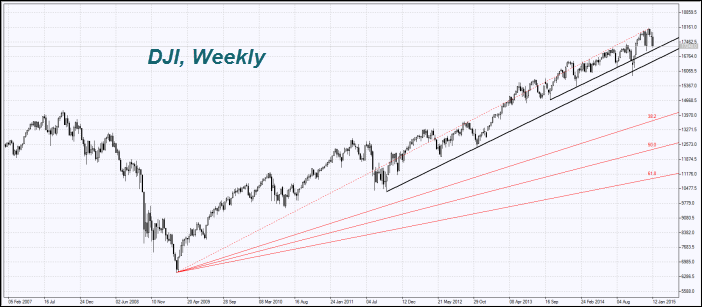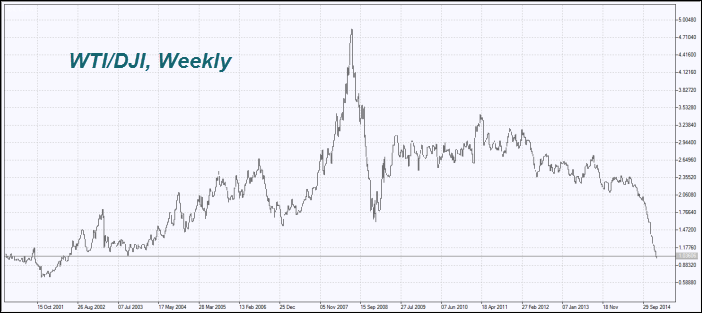By IFCMarkets
US stocks were traded lower on Thursday for the fifth consecutive time. Investors are concerned over global economy slowdown, which indicates a plunge in world crude oil prices, and fear that the results of American earnings reports wouldn’t meet their expectations. The US economic data released on Wednesday and Thursday appeared to be much worse-than-expected. Despite a steady increase in the number of jobs, Retail Sales in December dropped 0.9% unexpectedly, the record low over 11 months. For this reason, a few US investment banks cut the outlooks for Q4 US GDP in 2014 by approx 0.3%, to 3-3.4%. Yesterday markets were pulled down by weak Initial Claims, Philadelphia Fed Manufacturing Index, and also a strong dipping of the PPI in December. It sagged 0.3%, the deepest low since October 2011. PPI rose only 1.1% over 12 months.
The total Q4 earnings of the companies listed in S&P500 rose only 3.5%, while market participants expected it to be better-than-expected in early October (11.2%). Note that the index has added 3% since October 1. We deem it may be heavily affected by the quarterly earnings reports. Yesterday the top decliners were banks. After weak report releases, Bank of America stocks slumped 5.2%, Citigroup – 3.7%. The volume traded on US exchanges was 8.3% higher than the 5-day average and reached 7.9 billion shares. Today at 13:30 СЕТ Core CPI in December will be released in the US. The tentative outlook is positive. At 14:15 СЕТ we expect Industrial production data, which is likely to be dismal. Michigan Consumer Sentiment index will be announced at 15:00 СЕТ. The forecast is positive. As you can see, the forecasts in general are mixed.
The US dollar index ticked up yesterday after the news from Switzerland. In our opinion, it may move in the opposite direction to the US stock indices as stronger dollar reduces the competitive strength of US enterprises and vice versa. The Swiss National Bank (SNB) refused to support the euro at 1.2 francs, the rate which operated since September 2011. As the Swiss economy is deprived of risks appropriate to the EU, and in general looks sustainable, it triggered an abrupt surge of the Swiss franc by 20% against the euro. As a result, euro tumbled yesterday against the US dollar, hitting a new 11-year low. Meanwhile, European stock indices rose as the SNB decision raised the possibility of euro printing start next week. It would cause a splurge of liquidity on the EU markets. As franc strengthened, Swiss Market Index fell 3.1%, the lowest level at the intraday trading since 1989. The exchange rate has stabilized at one Swiss franc per euro. No more especially important reports are expected today in the EU. The second estimate of CPI in the EU and Germany will be released. It is expected to remain unchanged compared with the first estimate.
Nikkei has turned flat. It approached the lowest level since October 31, but couldn’t deepen lower. That day the Bank of Japan announced further measures on the monetary policy easing. Yen has climbed considerably since early January. We have previously suggested that it is actively used in carry trade. It could also have a positive impact on the Australian dollar, which has strengthened recently.
We deem that according to the expected dynamics on global markets, the WTI/OIL PCI is of considerable interest. It may be used in case of continued upward retracement in crude oil prices as US stock indices are traded down.
Free Reports:
 Get Our Free Metatrader 4 Indicators - Put Our Free MetaTrader 4 Custom Indicators on your charts when you join our Weekly Newsletter
Get Our Free Metatrader 4 Indicators - Put Our Free MetaTrader 4 Custom Indicators on your charts when you join our Weekly Newsletter
 Get our Weekly Commitment of Traders Reports - See where the biggest traders (Hedge Funds and Commercial Hedgers) are positioned in the futures markets on a weekly basis.
Get our Weekly Commitment of Traders Reports - See where the biggest traders (Hedge Funds and Commercial Hedgers) are positioned in the futures markets on a weekly basis.
Market Analysis provided by IFCMarkets